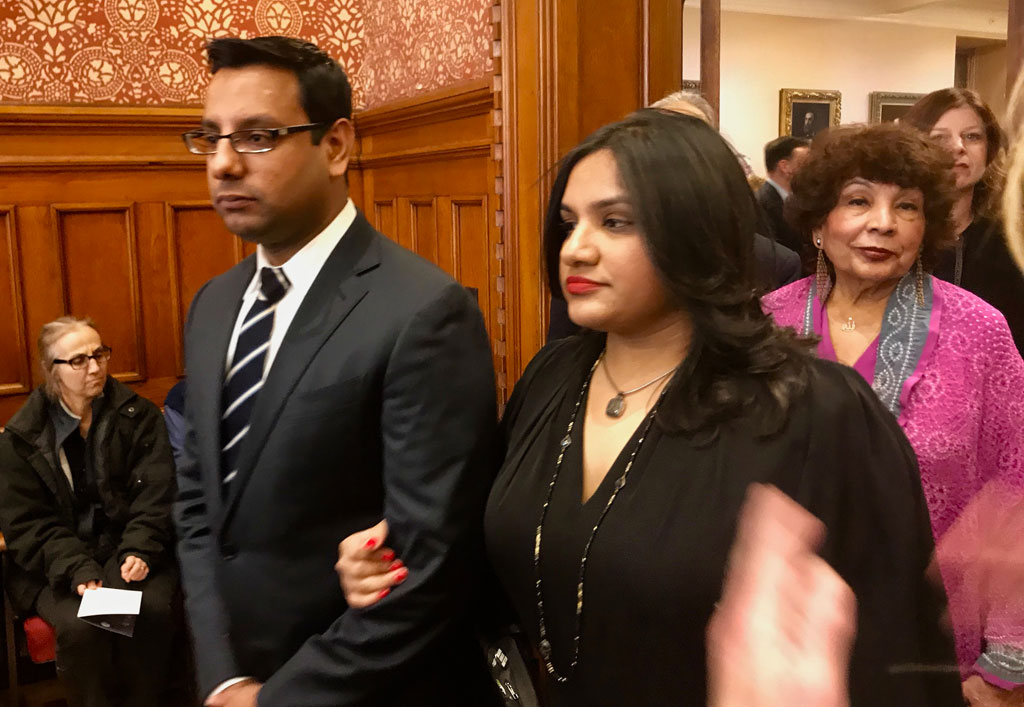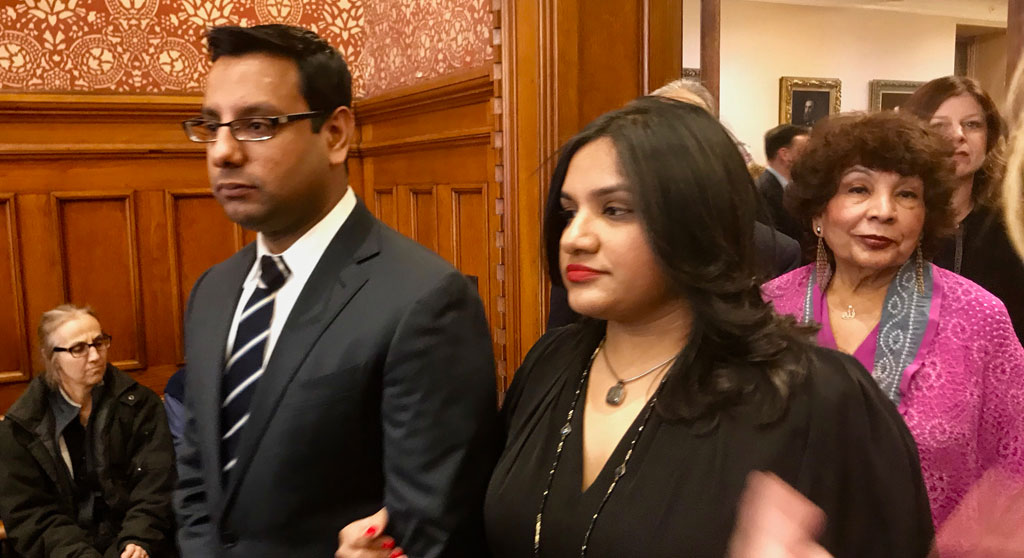Siddiqui is named mayor, Mallon vice mayor during latest fast election at council inaugural

Sumbul Siddiqui enters Sullivan Chamber in City Hall on Monday before her election as mayor. (Photo: Marc Levy)
For the fourth term in a row, the City Council elected a mayor and vice mayor – Sumbul Siddiqui and Alanna Mallon, respectively – at its inaugural meeting, held Monday at City Hall.
Siddiqui is the first Muslim mayor in Massachusetts, and having two women leading the city has also been described as a first.
Both leaders used their inaugural speeches to praise the value of public service, and to describe their work as being exactly that.

City councillor Alanna Mallon leads her family into Sullivan Chamber on Monday, before being elected vice mayor. (Photo: Marc Levy)
“People ask what I do and I tell them I’m a public servant. Public service has defined my life,” Siddiqui said upon accepting the mayor’s chair, telling of her parents’ struggles as immigrants to provide for their family by working minimum wage jobs but finding help from neighbors – just as Siddiqui found help from teachers and guidance counselors at Cambridge Public Schools. “Service is second nature in Cambridge. My goal as mayor will be to uphold that tradition.”
Mallon began her speech honoring Siddiqui and underlined the mayor’s message, saying that despite Cambridge’s claims to greatness in higher education and technological innovation and the council’s occasional “lofty” forays into national politics, “especially when passions run high, [we will remember] this job is truly about public service.”
Quick mayoral elections
The trend of quick mayoral elections relies on between-term backroom politicking to get the council working swiftly, according to insiders who have been through the process, to avoid the kind of legislative inertia seen in years such as 2010 and 2012. Mayoral elections took up to 10 ballots in those years (and, in 2012, required a special Wednesday meeting to resolve things) and lasted well into February, delaying the appointing of committee leaders and therefore slowing the hammering out of complex or controversial ordinances before being heard by the full council. The mayor also leads the six-member School Committee.
From the public’s perspective, Sumbul and Mallon were elected unanimously on their respective first ballots after a ceremony in which city clerk Anthony Wilson delivered the oath of office to each councillor.
But the easy election was signaled last week, when past term mayor Marc McGovern threw his support to Siddiqui, praising her work in the past term and also a belief “that as our city and schools continue to address issues of race in our community, having a mayor who can see these issues through a personal lens … will be vitally important.” The school district and especially the high school has been riven by racial controversies in recent years; School Committee member Emily Dexter said in December that she was opting out of serving her third term as the result of a race-related issue, despite winning reelection easily a month earlier.
Résumé on race, other issues
Siddiqui also organized with McGovern a series of community meetings about race and white privilege called Cambridge Digs Deep.
Facing issues of racism and bias in public institutions got a prominent nod in Siddiqui’s speech Monday, along with persistent problems such as affordable housing and the school system’s academic achievement gap. “I know we can make progress in what seems like intractable challenges,” she said.
And in telling her family’s story as immigrants from Pakistan finding a home in the United States, she said, “Thank goodness that place was Cambridge, a city that continues to welcome immigrants from around the world.” (Cambridge had a previous muslim councillor in Nadeem Mazen, who served two terms from 2014 to 2018.)
Among Siddiqui’s most prominent stands in the past term was her role in advancing development of East Cambridge’s former courthouse. In September, Siddiqui cast the deciding vote on granting parking spots needed for reuse of the structure, extracting more than the expected level of concessions out of developer Leggat McCall Properties: a doubling of affordable housing units to 48; a reduction in the number of parking spots requested; and another $3.5 million for the Affordable Housing Trust, for a total of $8 million.
And Siddiqui, as a Cambridge native who grew up in public housing, attended Cambridge Public Schools and worked as lawyer for the low-income and elderly, has also been popular at the polls. She was the only councillor elected in the first round of ranked-choice voting in November elections, surpassing quota with 2,516 No. 1 votes; that was a repeat of her feat from two years earlier, when she was the second-highest vote getter behind E. Denise Simmons and beat quota with 2,532 No. 1 votes.
Closely aligned
In the past, when the council has felt divided on major issues, the mayor and vice mayor have come from what could be roughly defined as different sides – such as the past term’s McGovern and Jan Devereux, who often voted apart on development issues.
But Siddiqui and Mallon are closely aligned, and Mallon on Monday referred to Siddiqui as her “sister.” Once Siddiqui became the obvious choice for mayor, Mallon accompanying her was all but predetermined, insiders said.
Mallon joined the council alongside Siddiqui, and the two remained close over the first time, linked in the public’s mind by partnering on hosting the “Women Are Here” podcast released through Cambridge Community Television. She became prominent in Cambridge first by founding a Cambridge Weekend Backpack Program that sent food home with more than 500 low-income students every weekend. That led to her hiring as education liaison to then-mayor David Maher. More recently, she has been prominent in trying to preserving Cambridge’s arts community.
The coming term
They will lead a council with two new members: Patty Nolan, who served on the School Committee for 14 years before winning a council seat on her first try; and newcomer Jivan Sobrinho-Wheeler. The five returning councillors with Siddiqui and Mallon are Dennis Carlone and McGovern, each entering their fourth terms; Simmons, in her 10th term; Tim Toomey, in his 16th term; and Quinton Zondervan, in his second term. (Jan Devereux, vice mayor in her second term, decided not to run for reelection; Craig Kelley lost his seat in a tight race with Sobrinho-Wheeler at the end of his seventh term.)
The term before them is fraught not only with the issue of race, but will see the likely return of an affordable housing overlay zoning concept tabled quietly last year after intense and intractable disagreement; a need to grapple with a city manager contract and potentially the running of a nationwide search process; amending and approving the Envision Cambridge master planning process; and a continued draining of the arts community exemplified by Harvard’s plan to move its theater stages to Allston.




Congratulations Sumbul and Alanna!
congratulations Sumbul and Alanna. The “women are here”. Sumbul will do a great job with the school committee and the tough issues there. But I do have some logistical questions. Will number one and number two still have their podcast which discusses city issues? Could this be considered a conflict of interest or a tool to sway the masses in key issues? And how can that be considered objective, transparent and fair to descenters. Also, given their alliances and representing the majority of housing advocates on the council, I had hoped that at least Dennis or Quinton would be considered as second to maintain a level playing field and broader opinion. I hope this stacking of the deck can be re-evaluated and the page turned in order to create a more inclusive, considered and less emotional discussion on hard topics. Emotion can’t create logical legislation.
I also had a question about the much touted Parking Garage vote that Sumbul exercised. As the swing vote, was the deal she came up with pre-determined (evidenced by the swiftness of the applicants to agree), and, if this was a new plan being presented, why didn’t it go back to the full council to discuss instead of a single councilor determining the outcome of such a loaded project- eliminating further citizen input with such a new plan? It felt like a back room deal. I hope moving forward that the new mayor and her sidekick take more thoughtful time to consider the bigger picture and I hope, after asking the good questions both do, really have the courage of their convictions to vote accordingly instead of going along to get along.